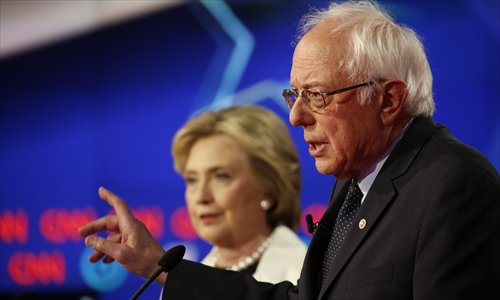Computer campaign
Savvy social media use gets millenials feeling the Bern

Bernie Sanders and Hillary Clinton (left) attend the Brooklyn Democratic Debate at the Brooklyn Navy Yards in New York, on April 14. Photo: IC
When Bernie Sanders first announced his campaign 11 months ago, he was barely known to the public at large. What's worse, observers didn't take him seriously. Now Sanders attracts large crowds of supporters and he has become someone many people pay attention to.
Sanders held a rally last week in the Oncenter Convention Center in Syracuse, New York in which about 2,000 people gathered to support him in the upcoming New York primary on Tuesday. The line started at 9 am for the 11 am event.
Alongside the real-world event, over 5,000 people took to social media to support Sanders in the Central New York area, according to data collected by Jennifer Grygiel, a social media professor at the SI Newhouse School of Public Communications in Syracuse University.
"I don't think Bernie Sanders would be a candidate without social media," said Grygiel, who focuses on the analyzing of social media data and the trend of social media use in political campaigning.
Grygiel praised Sanders' strategy of effectively using social media to get people's attention. From using the hashtag #FeelTheBern on Twitter to utilizing some internal social media such as Slack, Sanders' campaign team has been successful in getting people out to rally and campaign for the election.
Interesting note: About 60-70 percent of the crowd in the rally at Syracuse are young people, even including some high school students who took the day off to show their support for Sanders.
Sheridan Crane, a 17-year-old senior at Clinton Central High School, said he first noticed Sanders about 10 months ago when looking through Facebook on his phones. He was inspired by Sanders' political opinions and decided to support the 74-year-old Vermont Senator.
Joe Driscoll, the local campaign manager of Sanders' political event at Syracuse who says Sanders is still seen as an underdog by the public, said before the rally the Senator posted about it on Facebook five or six times a day and that's the main way they organize events.
"In a small town, a small city like this, it's hard to get a good turnout but you can give power to everyone to participate and help the candidates by posting on social media," Driscoll said.
The booming use of social media in political campaigns can be traced back to the 2008 Obama campaign. Grygiel said compared with a decade ago, social media is way more conversational and attracts more young voices. But Grygiel also voiced concerns about the actual young voters' appearance on New York primary day.
"Bernie Sanders' campaign has specifically energized millennial voters and I see those voters are fired up," said Grygiel.
But she also pointed out that energy from young voters has to translate into actual votes. "Social media is a part of the election but the bottom line is that people need to show up and vote," she said.
The use of social media has side effects. "The more attention you get, people care about it more," said Grygiel. Recognition is good, until some of it comes blowing back at a candidate as inflammatory, crazy content.
The Twitter account, "Bernie vs. Hillary," has 556,000 followers and Donald Trump attacks people and says terrible things relating to the campaign. Also, a recent joke - seen by some as racist - Hillary Clinton shared with New York City Mayor Bill de Blasio became a heated discussion on Twitter and put her in an awkward position before the New York primary.
Social media networks form an online community for people to share information and opinions and at the same time all the information they put out there cannot be fact checked, said Grygiel.
The information could be biased and could cause trouble for candidates. So, the candidates may be taking risks if they publish irrelevant information. "But social media is the heart of the election," Grygiel said.
Ezra Mead, a 17-year-old senior at Clinton Central High School, took the day off from school to see Sanders in Syracuse. Mead said social media allowed him to know more about the candidates and it's a lot easier for the Sanders to get fund-raising and expand his voter base using social media.
The author is a Newhouse graduate student in Syracuse University. wxin@syr.edu